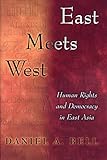East Meets West : Human Rights and Democracy in East Asia / Daniel A. Bell.
Material type: TextPublisher: Princeton, NJ : Princeton University Press, [2000]Copyright date: ©2000Edition: Core TextbookDescription: 1 online resource (384 p.)Content type:
TextPublisher: Princeton, NJ : Princeton University Press, [2000]Copyright date: ©2000Edition: Core TextbookDescription: 1 online resource (384 p.)Content type: - 9780691005089
- 9781400823550
- online - DeGruyter
- Issued also in print.
| Item type | Current library | Call number | URL | Status | Notes | Barcode | |
|---|---|---|---|---|---|---|---|
 eBook
eBook
|
Biblioteca "Angelicum" Pont. Univ. S.Tommaso d'Aquino Nuvola online | online - DeGruyter (Browse shelf(Opens below)) | Online access | Not for loan (Accesso limitato) | Accesso per gli utenti autorizzati / Access for authorized users | (dgr)9781400823550 |
Browsing Biblioteca "Angelicum" Pont. Univ. S.Tommaso d'Aquino shelves, Shelving location: Nuvola online Close shelf browser (Hides shelf browser)

|

|

|

|

|

|

|
||
| online - DeGruyter The Ambiguous Embrace : Government and Faith-Based Schools and Social Agencies / | online - DeGruyter Covenantal Rights : A Study in Jewish Political Theory / | online - DeGruyter Rousseau's Republican Romance / | online - DeGruyter East Meets West : Human Rights and Democracy in East Asia / | online - DeGruyter Rites and Rank : Hierarchy in Biblical Representations of Cult / | online - DeGruyter The Artless Jew : Medieval and Modern Affirmations and Denials of the Visual / | online - DeGruyter Idolatry and Representation : The Philosophy of Franz Rosenzweig Reconsidered / |
Frontmatter -- Contents -- Acknowledgments -- Introduction -- PART I. THE EAST ASIAN CHALLENGE TO HUMAN RIGHTS AND DEMOCRACY: REFLECTIONS ON EAST-WEST DIALOGUES -- PART II. THE PROS AND CONS OF DEMOCRACY IN SINGAPORE: A FICTITIOUS DIALOGUE WITH LEE KUAN YEW -- PART III. DEMOCRACY WITH CHINESE CHARACTERISTICS -- Select Bibliography -- Index
restricted access online access with authorization star
http://purl.org/coar/access_right/c_16ec
Is liberal democracy a universal ideal? Proponents of "Asian values" argue that it is a distinctive product of the Western experience and that Western powers shouldn't try to push human rights and democracy onto Asian states. Liberal democrats in the West typically counter by questioning the motives of Asian critics, arguing that Asian leaders are merely trying to rationalize human-rights violations and authoritarian rule. In this book--written as a dialogue between an American democrat named Demo and three East Asian critics--Daniel A. Bell attempts to chart a middle ground between the extremes of the international debate on human rights and democracy. Bell criticizes the use of "Asian values" to justify oppression, but also draws on East Asian cultural traditions and contributions by contemporary intellectuals in East Asia to identify some powerful challenges to Western-style liberal democracy. In the first part of the book, Bell makes use of colorful stories and examples to show that there is a need to take into account East Asian perspectives on human rights and democracy. The second part--a fictitious dialogue between Demo and Asian senior statesman Lee Kuan Yew--examines the pros and cons of implementing Western-style democracy in Singapore. The third part of the book is an argument for an as-yet-unrealized Confucian political institution that justifiably differs from Western-style liberal democracy. This is a thought-provoking defense of distinctively East Asian challenges to Western-style liberal democracy that will stimulate interest and debate among students of political theory, Asian studies, and international human rights.
Issued also in print.
Mode of access: Internet via World Wide Web.
In English.
Description based on online resource; title from PDF title page (publisher's Web site, viewed 30. Aug 2021)


